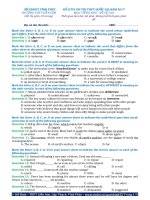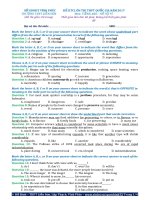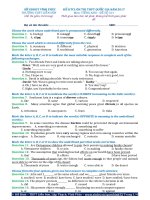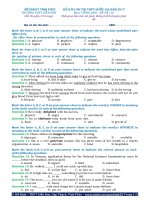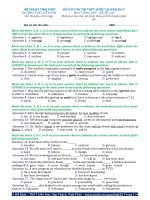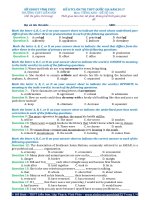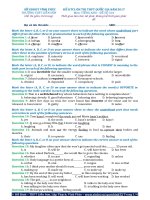GCSE MOCK TESTS 352
Bạn đang xem bản rút gọn của tài liệu. Xem và tải ngay bản đầy đủ của tài liệu tại đây (74.99 KB, 5 trang )
SƠ GD&ĐT VINH PHUC
TRƯƠNG THPT LIÊN SƠN
(Đề thi gồm: 05 trang)
ĐỀ KTCL ƠN THI THPT QUỐC GIA NĂM 20172018
Mơn: TIẾNG ANH – ĐÊ SỐ 352
Thời gian làm bài: 60 phút, không kể thời gian phát
đề
Ho va tên thi sinh:……………………………………………………………………. SBD:…………………………
Mark the letter A, B, C, or D on your answer sheet to indicate the word whose underlined
part differs from the other three in pronunciation in each of the following questions.
Question 01. A. young
B. plough
C. couple
D. cousin
Question 02. A. chamber B. ancient
C. danger
D. ancestor
Mark the letter A, B, C, or D on your answer sheet to indicate the word that differs from the
other three in the position of primary stress in each of the following questions.
Question 03. A. economy
B. economic
C. population
D. engineer
Question 04. A. open
B. happen
C. offer
D. begin
Mark the letter A, B, C, or D on your answer sheet to indicate the underlined part that needs
correction in each of the following questions.
Question 05. The kin receives nearly the third of the blood pumped out by the heart.
A. nearly
B. the
C. pumped out
D. by
Question 06. I had my motorbike repair yesterday but now it still doesn’t work.
A. had
B. repair
C. but now
D. work
Question 07. If you are working with young children in a primary school, you will find that teaching
lively songs and rhymes are very popular.
A. with
B. primary
C. will find
D. are
Mark the letter A, B, C, or D on your answer sheet to indicate the correct answer to each of
the following questions.
Question 08. The boy was sent to the police because of several________ that he had taken part in.
A. set-to
B. set-toes
C. sets-to
D. set-tos
Question 09. I just can't________ that noise any longer!
A. put up with
B. stand in for
C. sit out
D. stand up to
Question 10. ________ should a young child be allowed to play with fireworks without adult
supervision.
A. Under no circumstances B. No sooner than C. Always
D. Only when
Question 11: Nobody phoned while I was out, ________?
A. wasn't I
B. was I
C. did they
D. didn't they
Question 12: ________ migrate long distances is well documented.
A. That it is birds
B. That birds
C. Birds that
D. It is that birds
Question 13: ________ he is old, he wants to travel around the world.
A. In spite of
B. Although
C. Despite
D. Because
Question 14: Had I studied harder, I________ better in the last exam.
A. would do
B. would have done
C. had done D. wouldn't have done
Question 15: Nowadays women________ the same wages as men
A. should pay
B. will be paid
C. will pay
D. should be paid
Question 16: Do you know the woman________ lives next door?
A. she
B. who
C. whom
D. her
Question 17: If you________ less last night, you________ so bad today.
A. had drunk- would not have felt
B. drank- would not feel
C. had drunk- would not feel
D. would have drunk- would not feel
Question 18: I can't sleep________ the hot weather.
A. because of
B. as
C. because
D. since
Question 19: British and Australian people share the same language, but in other respects they
are as different as________.
A. cats and dogs
B. chalk and cheese
C. salt and pepper
D. here and there
Mark the letter A, B, C, or D on your answer sheet to indicate the most suitable response to
complete each of the following exchanges.
Question 20: Jane: "Would you mind if I use your computer for an hour?”
Tony: "_____________"
A. Not at all. I've finished my job
B. Yes, you can use it.
C. Of course not. I still need it now
D. Yes, it's all right.
Question 21: Teacher: "Jon, you've written a much better essay this time." Jon: "_____________"
A. Writing? Why?
B. Thank you. It's really encouraging,
C. You're welcome.
D. What did you say? I'm so shy.
Mark the letter A, B, C, or D on your answer sheet to indicate the word(s) CLOSEST in
meaning to the underlined word(s) in each of the following questions.
Question 22: The unmanned U.S. space probe Mariner 9 sent back over 7,000 photos of Mars.
A. circulated
B. transmitted
C. conveyed
D. submitted
Question 23: There was a long period without rain in the countryside last year so the harvest
was poor.
A. famine.
B. flood
C. drought
D. epidemic
Mark the letter A, B, C, or D on your answer sheet to indicate the word(s) OPPOSITE in
meaning to the underlined word(s) in each of the following questions.
Question 24: Thousands are going starving because of the failure of this year's harvest.
A. hungry
B. rich
C. poor
D. full
Question 25: There is growing concern about the way man has destroyed the environment.
A. ease
B. attraction
C. consideration
D. speculation
Mark the letter A, B, C, or D on your answer sheet to indicate the sentence that is CLOSEST in
meaning to each of the following questions.
Question 26: “Why don't you get your hair cut, Gavin?” said Adam.
A. Adam advised Gavin to cut his hair.
B. Gavin was suggested to have a haircut.
C. It was suggestable that Adam get Gavin's haircut.
D. Adam suggested that Gavin should have his haircut.
Question 27: Although he was very tired, he agreed to help me with my homework.
A. Tired as he was, he agreed to help me with my homework.
B. Despite being very tired, but he agreed to help me with my homework.
C. Tired though he was, but he agreed to help me with my homework.
D. As tired as was he, he agreed to help me with my homework.
Question 28: Susan is more attractive than her sister.
A. Susan's sister looks very attractive.
B. Susan's sister is not as attractive as her.
C. Susan is not so attractive as her sister. D. Susan looks more attractively than her sister.
Mark the letter A, B, C, or D on your answer sheet to indicate the sentence that best
combines each pair of sentences in the following questions.
Question 29: Phillip snored all night. I didn't sleep a wink.
A. I didn't sleep a wink, which made Philip snore all night.
B. Philip snored all night as a result of my sleeplessness.
C. What with Philip snoring all night, I didn't sleep a wink.
D. What made Philip snore all night was my sleeplessness.
Question 30: You'd better take the keys. It's possible I'll come home late.
A. You'd better take the keys as I possibly come home late.
B. You'd better take the keys in case I come home late.
C. I'll probably come home late so that you'd better take the keys.
D. If I come home late, you'd better take the keys.
Read the following passage and mark the letter A, B, C, or D on your answer sheet to
indicate the correct word or phrase that best fits each of the numbered blanks from 31 to 35.
THE ENGLISH CHANNEL
Engineers have dreaming of an underwater link between Britain and France (31)________
1802 . Finally in 1994 the Channel Tunnel (nicknamed " The Chunnel " by the English) was
officially opened.
This fifteen billion dollar project took seven years to (32)________. It is about 50 km long and
built 45 metres under the seabed. The trains which go through the Chunnel can travel at up 300
km/h due to the (33)________ electrical system.
The journey from London to Paris via the Chunnel takes just three hours. It is also handy for
drivers since they can load their cars onto the trains. They don't need to book in (34)________, as
trains (35)________ every few minutes.
Question 31.
A. from
B. during
C. since
D. ago
Question 32.
A. perform
B. achieve
C. deal with
D. complete
Question 33.
A. forward
B. advanced
C. higher
D. increased
Question 34.
A. advance
B. time
C. ahead
D. future
Question 35.
A. go away
B. exit
C. set out
D. depart
Read the following passage and Mark the letter A, B, C or D on your answer sheet to indicate
the correct answer to each of the questions from 36 to 42.
The principle of use and disuse states that those parts of organisms' bodies that are used
grown larger. Those parts that are not tend to wither away. It is an observed fact that when you
exercise particular muscles, they grow. Those that are never used diminish. By examining a man's
body, we can tell which muscles he uses and which he doesn't, we may even be able to guess his
profession or his reaction. Enthusiasts of the "body- building" cult make use of the principle of use
and disuse to "build" their bodies, almost like a piece of sculpture, into whatever unnatural shape
is demanded by fashion in this peculiar minority culture. Muscles are not the only parts of the
body that respond to use in this kind of way. Walk barefoot and you acquire harder skin on your
soles. It is easy to tell a farmer from a bank teller by looking at their hands alone. The farmer's
hands are horny, hardened by long exposure to rough work. The teller's hands are relatively soft.
The principle of use and disuse enables animals to become better at the job of surviving in
their world, progressively better during their lifetime as a result of living in that world. Humans,
through direct exposure to sunlight, or lack of it, develop a skin color which equips them better to
survive in the particular local conditions.
Too much sunlight is dangerous. Enthusiastic sunbathers with very fair skins are
susceptible to skin cancer. Too little sunlight, on the other hand, leads to vitamin-D deficiency and
rickets. The brown pigment melanin which is synthesized under the influence of sunlight, makes a
screen to protect the underlying tissues from the harmful effects of further sunlight. If a suntanned
person moves to a less sunny climate, the melanin disappears, and the body is able to benefit from
what little sun there is. This can be represented as an instance of the principle of use and disuse:
skin goes brown when it is "used", and fades to white when it is not.
Question 36: What does the passage mainly discuss?
A. How the principles of use and disuse change people's concepts of themselves.
B. The changes that occur according to the principle of use and disuse.
C. The way in which people change themselves to conform to fashion.
D. The effects of the sun on the principle of use and disuse.
Question 37: The phrase “wither away” in line 2 is closest in meaning to__________.
A. split
B. rot
C. perish
D. shrink
Question 38: According to the passage, men who body build__________.
A. appear like sculptures
B. change their appearance
C. belong to strange cults
D. are very fashionable
Question 39: From the passage, it can be inferred that author views body building _.
A. with enthusiasm B. as an artistic form C. with scientific interest D. of doubtful benefit
Question 40: It can be inferred from the passage that the principle of use and disuse enables
organisms to__________.
A. survive in any condition
B. automatically benefit
C. change their existence
D. improve their lifetime
Question 41: In the second paragraph, the author mentions sun tanning as an example of__________.
A. humans improving their local condition
B. humans surviving in adverse conditions
C. humans using the principle of use and disuse
D. humans running the risk of skin cancer
Question 42: The word "susceptible" could be best replaced by__________.
A. condemned
B. vulnerable
C allergic
D. suggestible
Read the following passage and mark the letter A, B, C, or D on your answer sheet to
indicate the correct answer to each of the questions from 43 to 50.
An air pollutant is defined as a compound added directly or indirectly by humans to the
atmosphere in such quantities as to affect humans, animals, vegetation, or materials adversely. Air
pollution requires a very flexible definition that permits continuous changes. When the first air
pollution laws were established in England in the fourteenth century, air pollutants were limited
to compounds that could be seen or smelled- a far cry from the extensive list of harmful substances
known today. As technology has developed and knowledge of health aspects of various chemicals
has increased, the list of air pollutants has lengthened. In the future, even water vapor might be
considered an air pollutant under certain conditions.
Many of more important air pollutants, such as sulfur oxides, carbon monoxides and
nitrogen oxides are found in nature. As the Earth developed, the concentration of these pollutants
was altered by various chemical reactions; they became components in biogeochemical cycles.
These serve as an air purification scheme by allowing the compounds to move from the air to the
water or soil. On a global basis, nature's output of these compounds dwarfs that resulting from
human activities.
However, human production usually occurs in a localized area, such as a city. In such region,
human output may be dominant and may temporarily overload the natural purification scheme of
the cycles. The result is a concentration of noxious chemicals in the air. The concentrations at
which the adverse effects appear will be greater than the concentrations that the pollutants would
have in the absence of human activities. The actual concentration need not be large for a
substance to be a pollutant; in fact, the numerical value tells us little until we know how much of
an increase this represents over the concentration that would occur naturally in the area. For
example, sulfur dioxide has detectable health effects at 0. 08 parts per million (ppm), which is
about 400 times its natural level. Carbon monoxide, however has a natural level of 0.1 ppm and is
not usually a pollutant until its level reaches about 15 ppm.
Question 43. The word "adversely" is closest in meaning to__________.
A. considerably
B. quickly
C. admittedly
D. negatively
Question 44. According to the passage, the numerical value of the concentration level of a
substance is only useful if__________.
A. the other substances in the area are known
B. it can be calculated quickly.
C. it is in a localized area
D. the natural level is also known.
Question 45. It can be inferred from the first paragraph that__________.
A. the definition of air pollution will continue to change.
B. water vapor is an air pollutant in localized areas.
C. Most pollutants today can be seen or smelled.
D. a substance becomes an air pollutant only in cities.
Question 46. According to the passage, human- generated air pollution in localized regions
__________.
A. will react harmfully with natural pollutants.
B. can overwhelm the natural system removing pollutants.
C. will damage area outside of the localized regions.
D. can be dwarfed by nature's output of pollutants.
Question 47. The word "These” in the second paragraph refers to__________.
A. the compounds moved to the water or soil B. the various chemical reactions.
C. the pollutants from the developing Earth D. the components in biogeochemical cycles.
Question 48. The word "localized“ is closest in meaning to__________.
.
A. specified
B. circled
C. encircled
D. surrounded
Question 49. Which of the following is best supported by the passage?
A. Scientists should be consulted in order to establish uniform limits for all air pollutants.
B. Human activities have been effective in reducing air pollution.
C. One of the most important steps in preserving natural lands is to better enforce air
pollution laws.
D. To effectively control pollution, local government should regularly review their air
pollution laws.
Question 50. What does the passage mainly discuss?
A. The effects of compounds added to the atmosphere.
B. The economic impact of air pollution.
C. What constitutes an air pollutant
D. How much harm air pollutants can cause.
_________THE END_________
